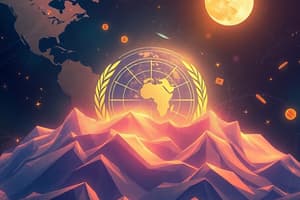Podcast
Questions and Answers
What actors facilitate economic globalization?
What actors facilitate economic globalization?
International organizations, governments, multinational corporations, and financial institutions.
What is economic globalization?
What is economic globalization?
A historical process representing the result of human innovation and technological progress.
What was the Silk Road?
What was the Silk Road?
The oldest known international trade route connecting China to the Middle East and Europe.
The Silk Road was a truly global trade route.
The Silk Road was a truly global trade route.
When did the Age of Globalization begin?
When did the Age of Globalization begin?
What is mercantilism?
What is mercantilism?
What is the Gold Standard?
What is the Gold Standard?
Countries abandoned the Gold Standard during World War I.
Countries abandoned the Gold Standard during World War I.
What is a fiat currency?
What is a fiat currency?
What is the Bretton Woods System?
What is the Bretton Woods System?
Who was John Maynard Keynes?
Who was John Maynard Keynes?
Flashcards are hidden until you start studying
Study Notes
Economic Globalization
- Economic globalization is a historical process driven by human innovation and technological advancement.
- Trade (goods and services) as a percentage of world GDP rose from 42.1% in 1980 to 62.1% in 2007.
- Increased trade facilitates rapid international investments through mechanisms like high-frequency trading, which executes millions of transactions in seconds using supercomputers.
International Trading Systems
- The Silk Road was the earliest known international trade route, connecting China to the Middle East and Europe, operational from 130 BCE to 1453 CE.
- Silk was the most profitable product traded via the Silk Road opened by the Chinese Han Dynasty and closed by the Ottoman Empire.
- Despite its scope, the Silk Road was not truly global due to the absence of sea routes to the Americas.
The Age of Globalization
- The Age of Globalization began with continuous product exchanges among populated continents.
- Flynn and Giraldez trace this back to 1571 with the establishment of the galleon trade linking Manila and Acapulco, marking the first direct trade connection between America and Asia.
- The galleon trade was part of mercantilism, an 18th-century system aiming to increase national wealth through stringent government regulations and trade surplus.
Gold Standard
- A shift to a more open trade system occurred in 1867 with the adoption of the gold standard by the U.S. and other European nations.
- The gold standard established fixed exchange rates based on gold value but imposed restrictions by requiring currency backing with gold reserves.
- World War I led many countries to abandon the gold standard due to depleted reserves, transitioning to floating currencies.
- The Great Depression of the 1920s to 1930s was exacerbated by the gold standard, which limited money circulation and decreased demand.
- The U.S. economic recovery began after abandoning the gold standard, allowing for increased government spending.
- Fiat currencies later emerged, not backed by precious metals, allowing governments to more flexibly manage their economies.
Bretton Woods System
- Post-World War II efforts to establish a stable global system culminated in the Bretton Woods Conference in 1944.
- Influenced by economist John Maynard Keynes, the system underscored the importance of active government intervention in economies to promote spending and prevent economic stagnation.
- Keynes's idea emphasized that economic crises stem from insufficient spending rather than a lack of currency availability.
Studying That Suits You
Use AI to generate personalized quizzes and flashcards to suit your learning preferences.




